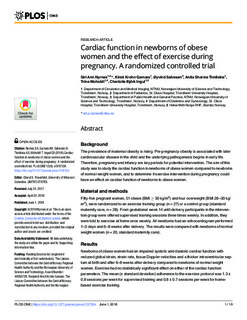| dc.contributor.author | Nyrnes, Siri Ann | |
| dc.contributor.author | Garnæs, Kirsti Krohn | |
| dc.contributor.author | Salvesen, Øyvind | |
| dc.contributor.author | Timilsina, Anita Sharma | |
| dc.contributor.author | Moholdt, Trine | |
| dc.contributor.author | Ingul, Charlotte Bjørk | |
| dc.date.accessioned | 2019-02-18T08:34:25Z | |
| dc.date.available | 2019-02-18T08:34:25Z | |
| dc.date.created | 2018-06-01T22:03:57Z | |
| dc.date.issued | 2018 | |
| dc.identifier.issn | 1932-6203 | |
| dc.identifier.uri | http://hdl.handle.net/11250/2585812 | |
| dc.description.abstract | Background
The prevalence of maternal obesity is rising. Pre-pregnancy obesity is associated with later cardiovascular disease in the child and the underlying pathogenesis begins in early life. Therefore, pregnancy and infancy are key periods for potential intervention. The aim of this study was to study the cardiac function in newborns of obese women compared to newborns of normal-weight women, and to determine if exercise intervention during pregnancy could have an effect on cardiac function of newborns to obese women.
Material and methods
Fifty-five pregnant women, 51 obese (BMI ≥ 30 kg/m2) and four overweight (BMI 28–30 kg/m2), were randomized to an exercise training group (n = 27) or a control group (standard maternity care, n = 28). From gestational week 14 until delivery participants in the intervention group were offered supervised training sessions three times weekly. In addition, they were told to exercise at home once weekly. All newborns had an echocardiogram performed 1–3 days and 6–8 weeks after delivery. The results were compared with newborns of normal weight women (n = 20, standard maternity care).
Results
Newborns of obese women had an impaired systolic and diastolic cardiac function with reduced global strain, strain rate, tissue Doppler velocities and a thicker intraventricular septum at birth and after 6–8 weeks after delivery compared to newborns of normal weight women. Exercise had no statistically significant effect on either of the cardiac function parameters. The mean (± standard deviation) adherence to the exercise protocol was 1.3 ± 0.8 sessions per week for supervised training and 0.8 ± 0.7 sessions per week for home-based exercise training.
Conclusions
Newborns of obese women had reduced cardiac function and thicker intraventricular septum compared to newborns of normal weight women. Exercise training during pregnancy had no significant effect, potentially due to a low number of subjects and low adherence to the exercise protocol. | nb_NO |
| dc.language.iso | eng | nb_NO |
| dc.publisher | Public Library of Science | nb_NO |
| dc.relation.uri | http://journals.plos.org/plosone/article/file?id=10.1371/journal.pone.0197334&type=printable | |
| dc.rights | Navngivelse 4.0 Internasjonal | * |
| dc.rights.uri | http://creativecommons.org/licenses/by/4.0/deed.no | * |
| dc.title | Cardiac function in newborns of obese women and the effect of exercise during pregnancy. A randomized controlled trial | nb_NO |
| dc.type | Journal article | nb_NO |
| dc.type | Peer reviewed | nb_NO |
| dc.description.version | publishedVersion | nb_NO |
| dc.source.volume | 13 | nb_NO |
| dc.source.journal | PLoS ONE | nb_NO |
| dc.source.issue | 6 | nb_NO |
| dc.identifier.doi | https://doi.org/10.1371/journal.pone.0197334 | |
| dc.identifier.cristin | 1588455 | |
| dc.description.localcode | Copyright: © 2018 Nyrnes et al. This is an open access article distributed under the terms of the Creative Commons Attribution License, which permits unrestricted use, distribution, and reproduction in any medium, provided the original author and source are credited. | nb_NO |
| cristin.unitcode | 194,65,25,0 | |
| cristin.unitcode | 194,65,1,0 | |
| cristin.unitname | Institutt for sirkulasjon og bildediagnostikk | |
| cristin.unitname | MH fakultetsadministrasjon | |
| cristin.ispublished | true | |
| cristin.fulltext | original | |
| cristin.qualitycode | 1 | |

